

A pedagogical framework for mobile learning: Categorizing educational applications of mobile technologies into four types. Yeonjeong Park Virginia Tech, USA Abstract Instructional designers and educators recognize the potential of mobile technologies as a learning tool for students and have incorporated them into the distance learning environment.
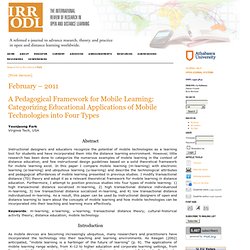
Peter Thiel: We’re in a Bubble and It’s Not the Internet. It’s Higher Education. Fair warning: This article will piss off a lot of you.
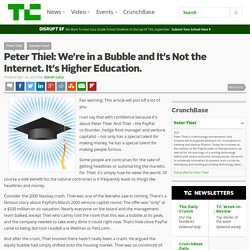
I can say that with confidence because it’s about Peter Thiel. And Thiel – the PayPal co-founder, hedge fund manager and venture capitalist – not only has a special talent for making money, he has a special talent for making people furious. Some people are contrarian for the sake of getting headlines or outsmarting the markets. For Thiel, it’s simply how he views the world. Of course a side benefit for the natural contrarian is it frequently leads to things like headlines and money. Consider the 2000 Nasdaq crash. And after the crash, Thiel insisted there hadn’t really been a crash: He argued the equity bubble had simply shifted onto the housing market. So Friday, as I sat with Thiel in his San Francisco home that he finally owns, I was curious what he thinks of the current Web frenzy. Instead, for Thiel, the bubble that has taken the place of housing is the higher education bubble.
Making matters worse was a 2005 President George W. Friends Don’t Let Friends Take Education Advice From Peter Thiel. My friends, my followers on Twitter, and people who’ve read my previous posts know that I have a very strong opinion about education: that it is absolutely necessary in order for you to build a foundation for success.
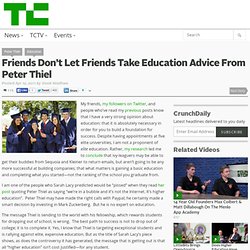
Despite having appointments at five elite universities, I am not a proponent of elite education. Universities. See our list of the top schools offering free courses online.
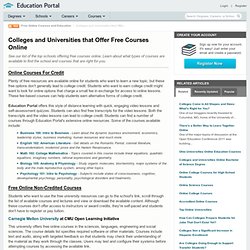
Learn about what types of courses are available to find the school and courses that are right for you. Online Courses for Credit Plenty of free resources are available online for students who want to learn a new topic, but these free options don't generally lead to college credit. Students who want to earn college credit might want to look for online options that charge a small fee in exchange for access to online lessons. These fee-based courses can help students earn alternative forms of college credit.
Education Portal offers this style of distance learning with quick, engaging video lessons and self-assessment quizzes. Free Online Non-Credited Courses. 100 Free Online Ivy League Courses. By Alisa Miller Even those without top notch grades can now go to Ivy League schools.
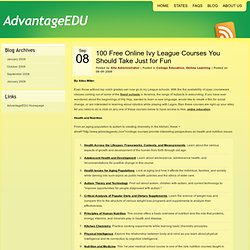
With the the availability of open courseware classes coming out of some of the finest schools in America, the range of subjects is astounding. If you have ever wondered about the beginnings of Hip Hop, wanted to learn a new language, would like to create a film for social change, or are interested in learning about robotics while playing with Legos, then these courses are right up your alley.
Technophilia. The Google+ Guide For Educators. Home » Education, Social Media Written by Grace2 August 2011 Unless you've been living under a rock the last month, undoubtedly you've heard of the new social networking site everyone has been raving about: Google+.
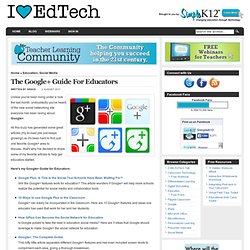
5 Startups to Watch. The future of teaching: Difference engine: Let the games begin. How we will learn. How Learning Environments Are Changing. Culture Digital Tools Teaching Strategies A school’s perimeters are no longer the only place students learn.
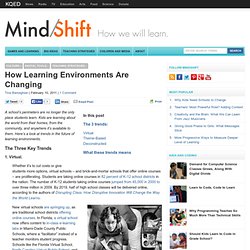
Kids are learning about the world from their homes, from the community, and anywhere it’s available to them. Here’s a look at trends in the future of learning environments. The Three Key Trends 1. Whether it’s to cut costs or give students more options, virtual schools – and brick-and-mortar schools that offer online courses – are proliferating. Flickr:Striatic New virtual schools are springing up, as are traditional school districts offering online courses.
Cost cutting is a big motivating factor for traditional schools offering online programs. Three Trends That Will Shape the Future of Curriculum. Big Ideas Culture Digital Tools Teaching Strategies What we as adults experienced in school, as educators and students, will bear little resemblance to what lies ahead.
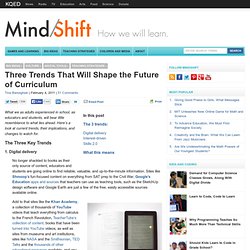
Here’s a look at current trends, their implications, and changes to watch for. The Three Key Trends 1. Digital delivery No longer shackled to books as their only source of content, educators and students are going online to find reliable, valuable, and up-to-the-minute information. FLickr:Remiforall Add to that sites like the Khan Academy, a collection of thousands of YouTube videos that teach everything from calculus to the French Revolution, TeacherTube’s collection of content, books that have been turned into YouTube videos, as well as sites from museums and art institutions, sites like NASA and the Smithsonian, TED Talks and the thousands of other educational resources available, and you can start to see how online content will be used as a primary resource. 2.
Flickr:YasminF Every learner counts. 3. Lenny Gonzalez. Three Trends That Define the Future of Teaching and Learning. Culture Digital Tools Teaching Strategies This week, we feature the most popular posts of the year on MindShift.
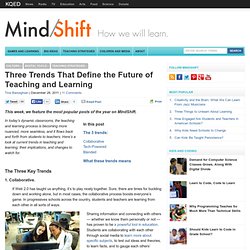
In today’s dynamic classrooms, the teaching and learning process is becoming more nuanced, more seamless, and it flows back and forth from students to teachers.